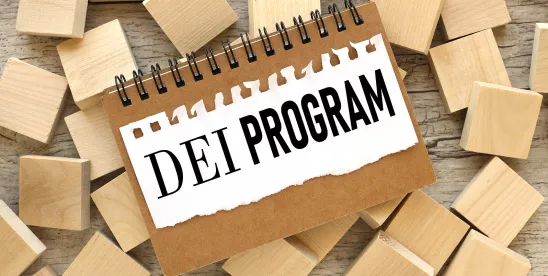Executive Summary
On January 20, 2025, President Donald Trump signed 26 executive orders (EO), a record number of EOs signed by a President on Inauguration Day.1 In his first two weeks as President, a handful of these orders directly call for the end of diversity, equity and inclusion (DEI) and diversity, equity, inclusion and accessibility (DEIA) programs in both the public and private sectors. DEI is a framework for organizations to promote fair and equal opportunities throughout the organization. These EOs follow DEI bans that have been enacted by various states, terminating DEI programs and practices in their respective colleges and universities during former President Biden’s administration.2
President Trump called for each agency to conduct civil compliance investigations of “publicly traded corporations, large non-profit corporations or associations, foundations with assets of $500 million or more, State and local bar and medical associations and institutions of higher education with endowments over 1 billion dollars”3 to end “illegal discrimination and preferences.”4 President Trump holds that DEI programs are in violation of the Civil Rights Act of 1964, undermine national unity, and threaten the safety of the American people by “diminishing the importance of individuals merit, aptitude, hard work and determination when selecting people for jobs and services.”5 The EOs detail the first course of action – all federal agencies, coordinating with the Attorney General and Office of Management and Budget (OMB), must remove all DEI programming and policies from its records and amend rules and regulations to advance “the policy of individual initiative, excellence and hard work.”6
Download the latest summary of Executive Orders terminating DEI programs. The chart is current as of February 18, 2025, and will be updated as new information becomes available.
Implications: Enforcement of the Orders and Impact on Tax-Exempt Organizations
Federal agencies are working to revise their rules and regulations to redefine which DEI programs and policies are “illegal.” Generally, the Internal Revenue Service (IRS) has a mechanism in place known as the illegality doctrine that revokes an organization’s tax-exempt status if the organization is formed for an illegal purpose or its activities violate public policy, and a substantial part of the organization’s activities were in furtherance of that illegal purpose or violation of public policy. Under Section 501(c)(3) of the Internal Revenue Code, nonprofit organizations qualify for tax-exempt status when 1) the purpose of the organization is charitable; 2) the activities are not illegal, contrary to public policy, or in conflict with express statutory restrictions; and 3) the activities are in furtherance of the organization’s exempt purpose and are reasonably related to the accomplishment of the purpose.7 Depending on the structure of the orders and degree of enforcement, promoting DEI programs and policies in an organization could be subject to IRS investigation under the illegality doctrine. It is unclear from the orders what DEI initiatives would be contrary to public policy.
Federal agencies have issued guidance expanding upon what DEI programs fall under their authority. For example, a memorandum was released by the Department of Justice’s Civil Rights Division (Department) detailing that the Department will enforce all federal civil rights laws by investigating, eliminating and penalizing “illegal DEI and DEIA preferences, mandates, policies, programs and activities in the private sector and in educational institutions that receive federal funds.”8 The Department clarified that activities related to “educational, cultural or historical observance”9 are not prohibited under the law so long as they do not engage in exclusion or discrimination. Guidance has not been issued by the IRS categorizing DEI programs that would jeopardize an organization’s tax-exempt status.
Implications: Civil Litigation for Tax-Exempt Organizations
Tax-exempt organizations may be vulnerable to litigation brought by the federal government or private actors. The government has not brought civil lawsuits against tax-exempt organizations in violation of the EOs, however, private actors have begun filing lawsuits against organizations whose DEI practices are allegedly in violation of federal and state laws. On February 11, 2025, Pacific Legal Foundation, on behalf of a California high school student, filed a complaint against UCSF Benoiff Children’s Hospitals for its Community Health and Adolescent Mentoring Program for Success (CHAMPS) violating the Equal Protection Clause of the Fourteenth Amendment and California’s Proposition 209.10 CHAMPS is an internship that “supports minority high school students interested in health professions.”11 Pacific Legal Foundation argues that CHAMPS should not include a racial component when considering which students qualify for this program that provides internship experience and mentorship in the hospital setting.12
Other lawsuits were filed by private parties against organizations over their DEI practices before the EOs were signed. In one example, on January 12, 2025, the American Alliance for Equal Rights, a nonprofit organization whose mission is to “challeng[e] distinctions and preferences made on the basis of race and ethnicity”13, filed a complaint in U.S. District Court for the Middle District of Tennessee against McDonald’s for funding a college scholarship program for students with “at least one parent of Hispanic/Latino heritage.”14 The scholarship program is funded by McDonald’s and administered by International Scholarship & Tuition Services, a for-profit company. The parties ultimately settled with McDonald’s, agreeing to allow non-Latino individuals to qualify for the scholarship program.
Conversely, other organizations in opposition to the EOs argue that the EOs are unconstitutional and vague. Several lawsuits have been filed, seeking an injunction to block the federal government from enforcing these anti-DEI orders. The National Association of Diversity Officers in Higher Education, along with other plaintiffs, filed a complaint in US District Court for the District of Maryland Baltimore Division on February 3, 2025, against Trump and several federal agencies, that argues the anti-DEI orders violate several clauses under the Constitution including the Spending Clause, the Due Process Clause under the Fifth Amendment, Separation of Powers and Free Speech Clause under the First Amendment.15
Overall, these ongoing lawsuits are divided into substantive and procedural legal arguments on the constitutionality of the EOs and DEI practices. Opponents of DEI base their complaints on substantive laws, arguing that DEI programs and policies violate the Equal Protection Clause and Title VI Civil Rights Act of 1964 because they do not center meritorious qualifications for employment, internships, grants or other opportunities. On the other hand, defenders of DEI highlight the EOs are procedurally unconstitutional. They argue the executive branch cannot unilaterally enforce laws that go against the will of Congress (Spending Clause) and targeted organizations are not provided with sufficient notice about what is prohibited under the EOs by not defining key terms such as DEI or DEIA (Due Process Clause). These different legal approaches may shape the changing DEI legal landscape to adhere to the ruling in Students for Fair Admissions case or leave this issue open to further challenges for tax-exempt organizations to navigate the best practices that are in alignment with their charitable purposes while complying with federal state laws on DEI.
Suggested Actions
- Review your organization’s internal governing documents, DEI policies and programs and how those policies and programs further your organization’s charitable purpose.
- Survey the organization’s ongoing federal, state, and local grants to ensure they comply with current federal regulations to the extent they are funded through federal funds, or to the extent state funds do not have similar restrictions at the state level.
- Review your organization’s scholarship programs, applications, joint venture agreements, and other relevant agreements. Pay special attention to the qualifications for applicants in any application forms, internal policies or external marketing materials. Additionally, evaluate any agreements that reference the organization’s charitable purpose, particularly those related to DEI practices. Consider ways to achieve your organization’s goals while minimizing risk exposure.
[1] See The Washington Post, Here are the executive actions and orders Trump Signed on Day 1 (January 13, 2025) https://www.washingtonpost.com/politics/2025/01/20/trump-executive-orders-list/.
[2] See Best Colleges, These States’ Anti-DEI Legislation May Impact Higher Education (January 22, 2025) https://www.bestcolleges.com/news/anti-dei-legislation-tracker/.
[3] See White House, Ending Illegal Discrimination and Restoring Merit-Based Opportunity (January 21, 2025) https://www.whitehouse.gov/presidential-actions/2025/01/ending-illegal-discrimination-and-restoring-merit-based-opportunity/.
[4] Id.
[5] Id.
[6] Id.
[7] Rev. Rul. 80-278, 1980-2 C.B. 175.
[8] Department of Justice Ending Illegal DEI and DEIA Discrimination and Preferences (February 5, 2025) https://www.justice.gov/ag/media/1388501/dl?inline.
[9] Id.
[10] See Pacific Legal Foundation, UCSF healthcare internship selects participants based on race, denying students equal access to educational opportunities https://pacificlegal.org/case/ucsf-minority-healthcare-scholarship-discrimination/.
[11] See UCSF Benoiff Children’s Hospitals, CCCH Programs CHAMPS https://www.ucsfbenioffchildrens.org/about/ccch/programs/champs.
[12] G.H., a minor, by Rebecca Hooley the mother, legal guardian, and next friend of G.H., Plaintiffs v. UNIVERSITY OF CALIFORNIA BOARD O F REGENTS; USCSF BENIOFF CHILDREN’S HOSPITALS; Michelle Ednacot, in her individual and official capacity as the CHAMPS program manager at UCSF BENOIFF CHILDREN’S HOSPITAL OAKLAND; Dr. Nicolas Holmes, in his individual and official capacity as President of UCSF BENOIFF CHILDREN’S HOSPITALS; and Janet Reilly, in her official capacity as President of the UNIVERSITY OF CALIFORNIA BOARD OF REGENTS, Defendants, 4:25-cv-01399, (N.D. Cal. 2/11/2025).
[13] See American Alliance for Equal Rights, https://americanallianceforequalrights.org/.
[14] American Alliance for Equal Rights v. McDonald’s Corporation; McDonald’s USA, LLC; International Scholarship & Tuition Services, Inc., 3:25-cv-00050, (M.D. Tenn. 1/12/2025).
[15] NATIONAL ASSOCIATION OF DIVERSITY OFFICERS IN HIGHER EDUCATION; American Association of University Professors; Restaurant Opportunities Centers United; Mayor and City Council of Baltimore, Maryland, Plaintiffs, v. Donald J. TRUMP, in his official capacity as President of the United States; Department of Health and Human Services; Dorothy Fink, in her official capacity as Acting Secretary of Health and Human Services; Department of Education; Denise Carter, in her official capacity as Acting Secretary of Education; Department of Labor; Vincent Micone, in his official capacity as Acting Secretary of Labor; Department of Interior; Doug Burgum, in his official capacity as Secretary of the Interior; Department of Commerce; Jeremy Pelter, in his official capacity as Acting Secretary of Commerce; Department of Agriculture; Gary Washington, in his official capacity as Acting Secretary of Agriculture; Department of Energy; Ingrid Kolb, in her official capacity as Acting Secretary of Energy; Department of Transportation; Sean Duffy, in his official capacity as Secretary of Transportation; Department of Justice; James McHenry, in his official capacity as Acting Attorney General; National Science Foundation; Sethuraman Panchanathan, in his official capacity as Director of the National Science Foundation; Office of Management and Budget; Matthew Vaeth, in his official capacity as Acting Director of the Office of Management and Budget, Defendants., 2025 WL 391958 (D.Md.)






 />i
/>i
